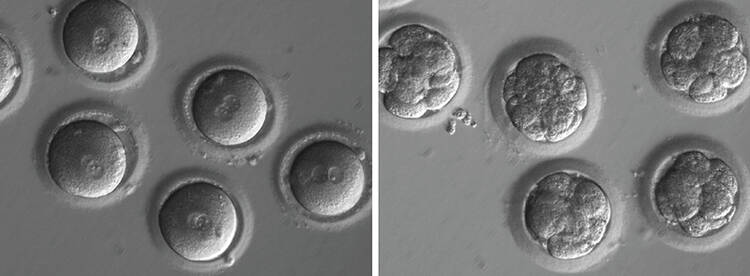(RNS)—News that scientists for the first time successfully edited genes in human embryos created a stir this week.
In the experiment, outlined in a paper in the journal Nature published Wednesday, Aug. 2, scientists essentially snipped a mutant gene known to cause a heart condition that can lead to sudden death.
The work is controversial because it showed that scientists could manipulate life in its earliest stages and that those changes would then be inherited by future generations, if the embryo were allowed to grow into a baby. The embryo in question was destroyed.
It also raised the tantalizing promise that the baby would be disease-free and would not transmit the disease to his or her descendants.
The work, a collaboration by the Salk Institute, Oregon Health and Science University and Korea’s Institute for Basic Science, was performed using private money since the United States forbids the use of federal funds for embryo research.
But it raises a host of ethical questions with religious ramifications. Should these edited embryos be allowed to develop into babies? Could scientists edit out undesirable traits to create customizable “designer babies”? Could it increase inequality in society between those with access to such technology and those without?
Arthur Caplan, the founding head of the Division of Bioethics at New York University, answered some of those questions. The interview was edited for length and clarity.
The gene editing findings are a breakthrough, do you agree?
It’s a breakthrough, but a baby step. It’s a demonstration of proof of principle, meaning you made a correction and didn’t kill the embryo, and as far as you know, it developed normally for a little bit. It still didn’t demonstrate that there weren’t some errors made in other parts of the embryo. That might appear later in development. But it’s certainly an exciting step.
People are now worried about the possibility of creating designer babies. Should they be?
I’m filled with amusement about that worry. The paper that was published was kind of like a demonstration that it’s possible to put a satellite in orbit. The designer baby question is sort of, ‘Can we travel to other galaxies?’ We aren’t very close. It’s not something anybody has to worry about right now. It’s certainly a consideration for our grandchildren, but not for us.
The questions today are: Who’d be watching this technique enough to decide how much safety and evidence there needs to be to try to make a baby using this technique? Who owns the technology and what will they charge people for it? Since most of the prior work on gene editing was funded by taxpayer money, it might be interesting to know if there’s going to be any effort to guarantee access at reasonable prices. The mapping of the human genome and everything that led up to this was publicly funded.
But this study was done with private money and that raises the possibility that further research can be done privately and maybe even abroad, right?
I will guarantee this technique will move forward. There are other governments in other countries that want to do it: China, Britain, Singapore, Taiwan, Korea. There are plenty of places around the world that would not see much to object to in continuing this work. What the United States does will not be the last word.
The idea that humanity would knowingly move back from the opportunity to prevent diseases from being passed on to future generations is ludicrous. The arguments about perfect babies, mutant humans or eugenics are not going to stop attempts to prevent disease or repair disease.








